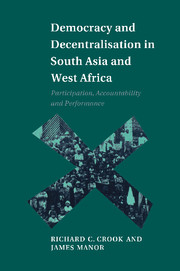2 - India (Karnataka)
Published online by Cambridge University Press: 12 October 2018
Summary
The structure of decentralization
At an election in 1983, the Janata Party won control of the government in the Indian state of Karnataka at a time when the Congress Party held power at the national level. Janata leaders wanted to demonstrate that they were more imaginative and radically democratic than their Congress rivals, to revive their party's fortunes nationally. They also had next to no party organisation in the state, and they believed that a new system of elected councils at the district level and below would provide a framework for party-building. They therefore undertook a programme of decentralisation which gave elected councillors control of more than half of the state's bureaucrats and responsibility for nearly every field of development.
Elected councils were created at two levels - the district and the lower, Mandai level. A Mandai Council covered a group of adjacent villages with a population of between 8,000 and 12,000 and consisted of around thirty members. Each of them was directly elected from a distinct territorial constituency averaging just under 400 voters. 2,536 Mandais were established, with 55,188 members. The small size of the Mandais, in relation to the much larger and far more powerful District Councils (Zilla Parishad), made them the less important of the two elements in the system. This was apparent from the power of the District Council to approve the annual budget estimates of the Mandais, to investigate their annual accounts and administration reports, to intervene in the event of irregularities, and to appoint and control their administrative staff.
There were nineteen District Councils in Karnataka. Members were directly elected by distinct territorial constituencies with an average population of 28,000 (except in one small, eccentric district), and the number of elected members of these councils varied between twentythree and sixty-four, depending on population. The members of the state Legislative Assembly and Legislative Council (the upper house), and of the Indian Parliament from the district also sat on the District Council with voting rights, but they were greatly outnumbered by elected councillors.
- Type
- Chapter
- Information
- Publisher: Cambridge University PressPrint publication year: 1998



